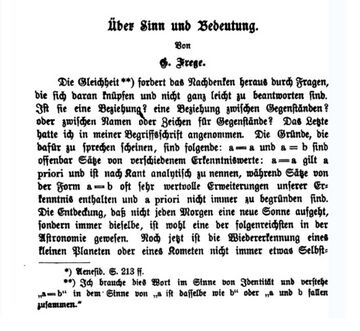Sense and reference
Topic: Philosophy
 From HandWiki - Reading time: 11 min
From HandWiki - Reading time: 11 min

In the philosophy of language, the distinction between sense and reference was an idea of the German philosopher and mathematician Gottlob Frege in 1892 (in his paper "On Sense and Reference"; German: "Über Sinn und Bedeutung"),[1] reflecting the two ways he believed a singular term may have meaning.
The reference (or "referent"; Bedeutung) of a proper name is the object it means or indicates (bedeuten), whereas its sense (Sinn) is what the name expresses. The reference of a sentence is its truth value, whereas its sense is the thought that it expresses.[1] Frege justified the distinction in a number of ways.
- Sense is something possessed by a name, whether or not it has a reference. For example, the name "Odysseus" is intelligible, and therefore has a sense, even though there is no individual object (its reference) to which the name corresponds.
- The sense of different names is different, even when their reference is the same. Frege argued that if an identity statement such as "Hesperus is the same planet as Phosphorus" is to be informative, the proper names flanking the identity sign must have a different meaning or sense. But clearly, if the statement is true, they must have the same reference.[2] The sense is a 'mode of presentation', which serves to illuminate only a single aspect of the referent.[3]
Much of analytic philosophy is traceable to Frege's philosophy of language.[4] Frege's views on logic (i.e., his idea that some parts of speech are complete by themselves, and are analogous to the arguments of a mathematical function) led to his views on a theory of reference.[4]
Background
Frege developed his original theory of meaning in early works like Begriffsschrift (concept script) of 1879 and Grundlagen (foundations of arithmetic) of 1884. On this theory, the meaning of a complete sentence consists in its being true or false,[5] and the meaning of each significant expression in the sentence is an extralinguistic entity which Frege called its Bedeutung, literally meaning or significance, but rendered by Frege's translators as reference, referent, 'Meaning', nominatum, etc. Frege supposed that some parts of speech are complete by themselves, and are analogous to the arguments of a mathematical function, but that other parts are incomplete, and contain an empty place, by analogy with the function itself.[6] Thus "Caesar conquered Gaul" divides into the complete term "Caesar", whose reference is Caesar himself, and the incomplete term "—conquered Gaul", whose reference is a concept. Only when the empty place is filled by a proper name does the reference of the completed sentence – its truth value – appear. This early theory of meaning explains how the significance or reference of a sentence (its truth value) depends on the significance or reference of its parts.
Sense


Frege introduced the notion of "sense" (German: Sinn) to accommodate difficulties in his early theory of meaning.[7]: 965
First, if the entire significance of a sentence consists of its truth value, it follows that the sentence will have the same significance if we replace a word of the sentence with one having an identical reference, as this will not change its truth value.[8] The reference of the whole is determined by the reference of the parts. If the evening star has the same reference as the morning star, it follows that the evening star is a body illuminated by the Sun has the same truth value as the morning star is a body illuminated by the Sun. But it is possible for someone to think that the first sentence is true while also thinking that the second is false. Therefore, the thought corresponding to each sentence cannot be its reference, but something else, which Frege called its sense.
Second, sentences that contain proper names with no reference cannot have a truth value at all. Yet the sentence 'Odysseus was set ashore at Ithaca while sound asleep' obviously has a sense, even though 'Odysseus' has no reference. The thought remains the same whether or not 'Odysseus' has a reference.[8] Furthermore, a thought cannot contain the objects that it is about. For example, Mont Blanc, 'with its snowfields', cannot be a component of the thought that Mont Blanc is more than 4,000 metres high. Nor can a thought about Etna contain lumps of solidified lava.[9]
Frege's notion of sense is somewhat obscure, and neo-Fregeans have come up with different candidates for its role.[10] Accounts based on the work of Carnap[11] and Church[12] treat sense as an intension, or a function from possible worlds to extensions. For example, the intension of ‘number of planets’ is a function that maps any possible world to the number of planets in that world. John McDowell supplies cognitive and reference-determining roles.[13] Michael Devitt treats senses as causal-historical chains connecting names to referents, allowing that repeated "groundings" in an object account for reference change.[14]
Sense and description
In his theory of descriptions, Bertrand Russell held the view that most proper names in ordinary language are in fact disguised definite descriptions. For example, 'Aristotle' can be understood as "The pupil of Plato and teacher of Alexander", or by some other uniquely applying description. This is known as the descriptivist theory of names. Because Frege used definite descriptions in many of his examples, he is often taken to have endorsed the descriptivist theory. Thus Russell's theory of descriptions was conflated with Frege's theory of sense, and for most of the twentieth century this "Frege–Russell" view was the orthodox view of proper name semantics. However, Saul Kripke argued compellingly against the descriptivist theory. According to Kripke,[15]: 48–49 proper names are rigid designators which designate the same object in every possible world. Descriptions such as "the President of the U.S. in 1969" do not designate the same in every possible world. For example, someone other than Richard Nixon, e.g. Hubert H. Humphrey, might have been the President in 1970. Hence a description (or cluster of descriptions) cannot be a rigid designator, and thus a proper name cannot mean the same as a description.[16]: 49
However, the Russellian descriptivist reading of Frege has been rejected by many scholars, in particular by Gareth Evans in The Varieties of Reference[17] and by John McDowell in "The Sense and Reference of a Proper Name",[18] following Michael Dummett, who argued that Frege's notion of sense should not be equated with a description. Evans further developed this line, arguing that a sense without a referent was not possible. He and McDowell both take the line that Frege's discussion of empty names, and of the idea of sense without reference, are inconsistent, and that his apparent endorsement of descriptivism rests only on a small number of imprecise and perhaps offhand remarks. And both point to the power that the sense-reference distinction does have (i.e., to solve at least the first two problems), even if it is not given a descriptivist reading.
Translation of Bedeutung
As noted above, translators of Frege have rendered the German Bedeutung in various ways. The term 'reference' has been the most widely adopted, but this fails to capture the meaning of the original German ('meaning' or 'significance'), and does not reflect the decision to standardise key terms across different editions of Frege's works published by Blackwell.[19] The decision was based on the principle of exegetical neutrality: that "if at any point in a text there is a passage that raises for the native speaker legitimate questions of exegesis, then, if at all possible, a translator should strive to confront the reader of his version with the same questions of exegesis and not produce a version which in his mind resolves those questions".[20] The term 'meaning' best captures the standard German meaning of Bedeutung. However, while Frege's own use of the term can sound as odd in German for modern readers as when translated into English, the related term deuten does mean 'to point towards'. Though Bedeutung is not usually used with this etymological proximity in mind in German, German speakers can well make sense of Bedeutung as signifying 'reference', in the sense of it being what Bedeutung points, i.e. refers to. Moreover, 'meaning' captures Frege's early use of Bedeutung well,[21] and it would be problematic to translate Frege's early use as 'meaning' and his later use as 'reference', suggesting a change in terminology not evident in the original German.
Precursors
Antisthenes
The Greek philosopher Antisthenes, a pupil of Socrates, apparently distinguished "a general object that can be aligned with the meaning of the utterance” from “a particular object of extensional reference". According to Susan Prince, this "suggests that he makes a distinction between sense and reference".[22]: 20 The principal basis of Prince's claim is a passage in Alexander of Aphrodisias' “Comments on Aristotle's 'Topics'” with a three-way distinction:
- the semantic medium, δι' ὧν λέγουσι
- an object external to the semantic medium, περὶ οὗ λέγουσιν
- the direct indication of a thing, σημαίνειν ... τὸ ...[23]: 518–522
Stoicism
The Stoic doctrine of lekta refers to a correspondence between speech and the object referred to in speech, as distinct from the speech itself. British classicist R. W. Sharples cites lekta as an anticipation of the distinction between sense and reference.[24]: 23
John Stuart Mill
The sense-reference distinction is commonly confused with that between connotation and denotation, which originates with John Stuart Mill.[25] According to Mill, a common term like 'white' denotes all white things, as snow, paper.[26]: 11–13 But according to Frege, a common term does not refer to any individual white thing, but rather to an abstract concept (Begriff). We must distinguish between the relation of reference, which holds between a proper name and the object it refers to, such as between the name 'Earth' and the planet Earth, and the relation of 'falling under', such as when the Earth falls under the concept planet. The relation of a proper name to the object it designates is direct, whereas a word like 'planet' has no such direct relation to the Earth at all, but only to a concept that the Earth falls under. Moreover, judging of anything that it falls under this concept is not in any way part of our knowledge of what the word 'planet' means.[27] The distinction between connotation and denotation is closer to that between concept and object than to that between 'sense' and 'reference'.
See also
- Descriptivist theory of names
- Definite description
- Direct and indirect realism
- Frege's puzzles
- Intensional logic
- Mediated reference theory
- Temperature paradox
- Theories of language
- Use–mention distinction
Footnotes
- ↑ 1.0 1.1 "On Sense and Reference" ["Über Sinn und Bedeutung"], Zeitschrift für Philosophie und philosophische Kritik, vol. 100 (1892), pp. 25–50, esp. p. 31.[non-primary source needed]
- ↑ "On Sense and Reference", p. 25
- ↑ "On Sense and Reference", p. 27
- ↑ 4.0 4.1 Jeff Speaks, "Frege's theory of reference" (2011)
- ↑ Gareth Evans, The Varieties of Reference, Oxford: Clarendon 1982, p. 8
- ↑ "Function and Concept", p. 16.
- ↑ Cassin, B., Apter, E., Lezra, J., & Wood, M., eds., Dictionary of Untranslatables: A Philosophical Lexicon (Princeton: Princeton University Press, 2014), p. 965.
- ↑ 8.0 8.1 "On Sense and Reference", p. 32.
- ↑ See Frege's undated letter to Philip Jourdain, published in Frege's Philosophical and Mathematical Correspondence, ed. Gottfried Gabriel, Hans Hermes, Friedrich Kanbartel, Christian Thiel and Albet Veraart, transl. Hans Kaal, Oxford: Blackwell 1980. (See also Frege's letter to Russell dated 1904, in the same collection.)
- ↑ Sam Cumming, Names, Stanford Encyclopedia of Philosophy 2013.
- ↑ Meaning and Necessity, Chicago: University of Chicago Press, 1947.
- ↑ “A Formulation of the Logic of Sense and Denotation”, in P. Henle, M. Kallen, and S. K. Langer, eds., Structure, Method, and Meaning, New York: Liberal Arts Press, 1951
- ↑ McDowell, J., “On the Sense and Reference of a Proper Name”, Mind, 86: 159–85, 1977.
- ↑ Devitt, M., Designation, New York: Columbia University Press, 1981.
- ↑ Kripke, S. A., Naming and Necessity, Cambridge, MA: Harvard University Press, 1980, pp. 48-49.
- ↑ Naming and Necessity, p. 49.
- ↑ Evans, Gareth (1982). John McDowell. ed. The Varieties of Reference. Oxford: Oxford University Press.
- ↑ McDowell, John (April 1977). "On the Sense and Reference of a Proper Name". Mind. New Series 86 (342).
- ↑ According to M. Beaney (ed., The Frege Reader, Oxford: Blackwell 1997, p. 36) 'the decision was taken at a meeting in the early 1970s attended by Michael Dummett, Peter Geach, William Kneale, Roger White and a representative from Blackwell. The translation of Bedeutung by 'meaning' was unanimously agreed after lengthy discussion'.
- ↑ Long, P. and White, A., 'On the Translation of Frege's Bedeutung: A Reply to Dr. Bell', Analysis 40 pp. 196-202, 1980, p. 196. See also Bell, D., "On the Translation of Frege's Bedeutung", Analysis Vol. 40, No. 4 (Oct., 1980), pp. 191-195.
- ↑ Beaney, p. 37
- ↑ Prince, S. H. (2015). Antisthenes of Athens: Texts, Translations, and Commentary. University of Michigan Press. p. 20.
- ↑ Prince 2015, pp. 518–522 (Antisthenes' literary remains: t. 153B.1).
- ↑ R. W. Sharples (1996), Stoics, Epicureans and Sceptics: An Introduction to Hellenistic Philosophy. Routledge, p. 23.
- ↑ See section §5 of book I, chapter i of Mill's A System of Logic
- ↑ Jong, W. R. de, The Semantics of John Stuart Mill (Dordrecht: D. Reidel, 1982), pp. 11–13.
- ↑ Frege, "A critical elucidation of some points in E. Schroeder's Vorlesungen Ueber Die Algebra der Logik, Archiv für systematische Philosophie 1895, pp. 433-456, transl. P. T. Geach, in Geach & Black 86-106.
 |
 KSF
KSF